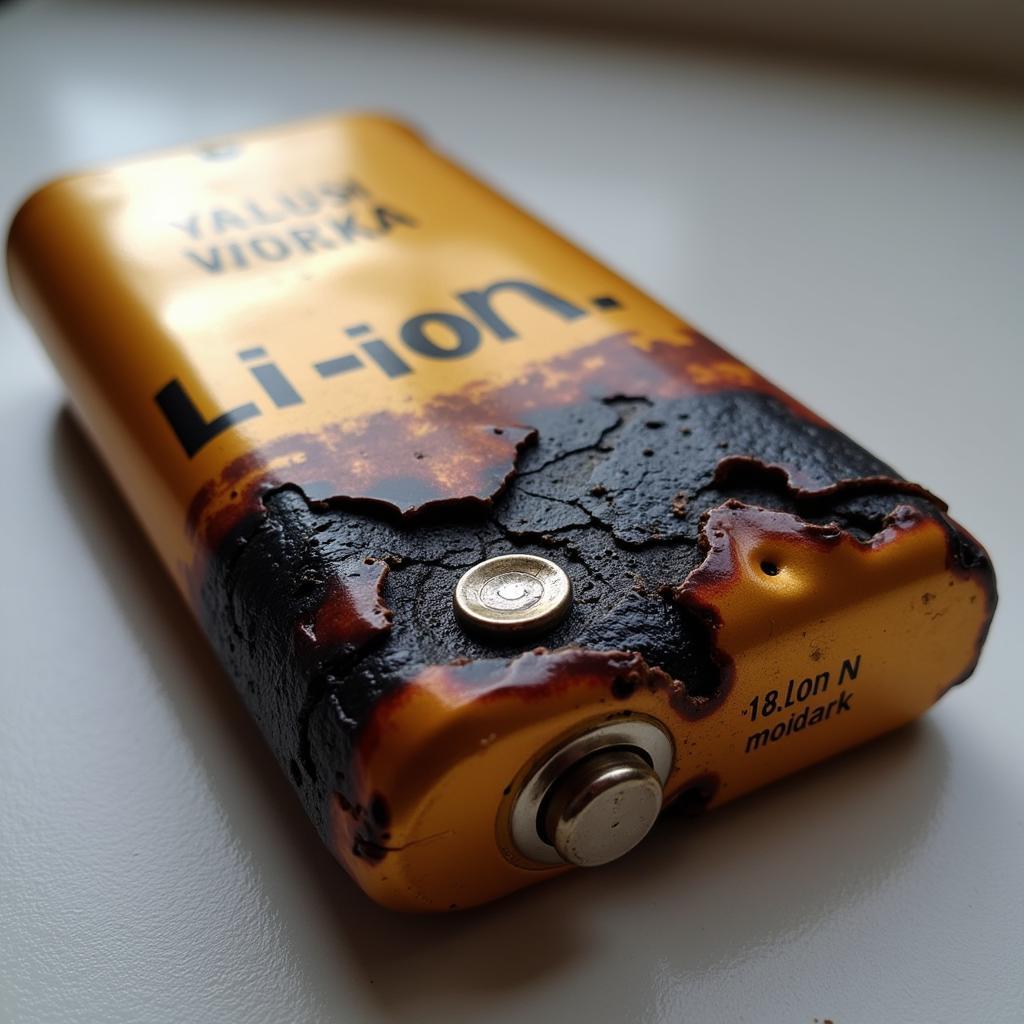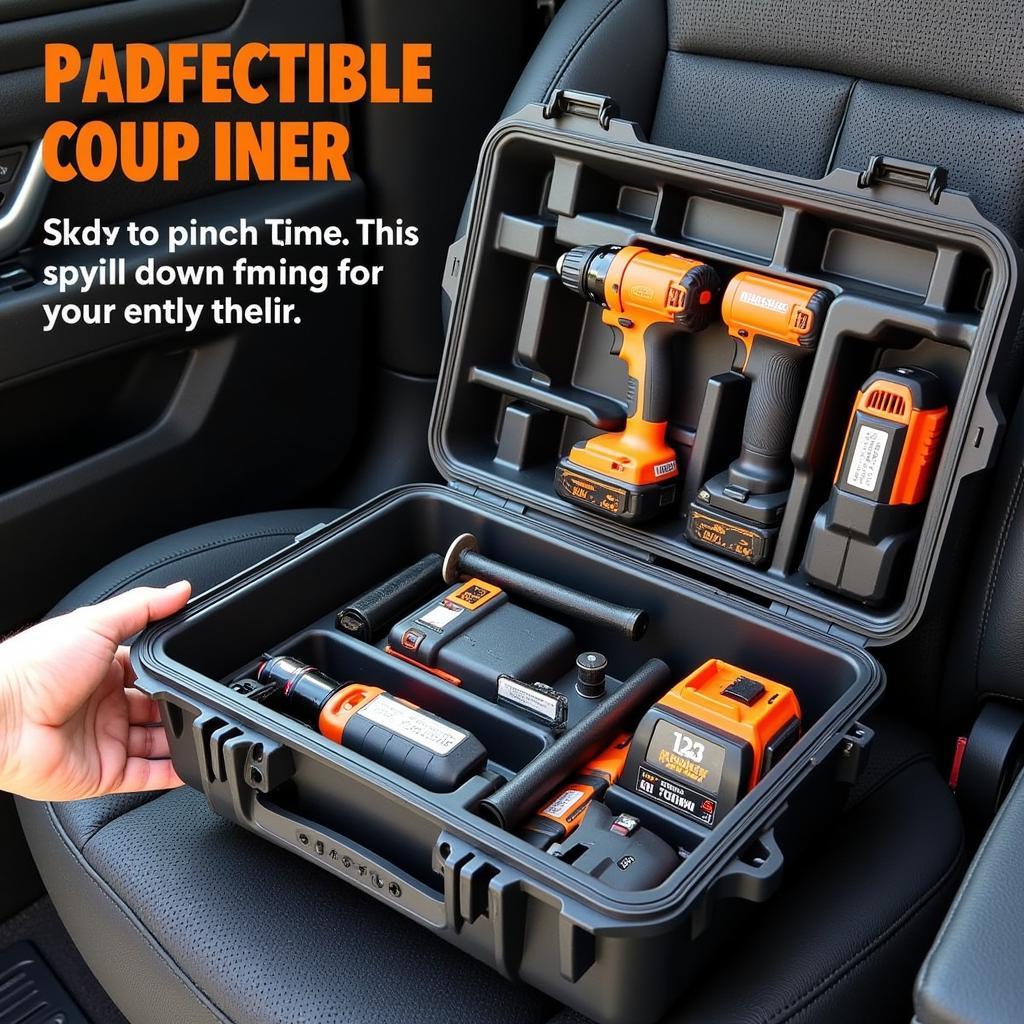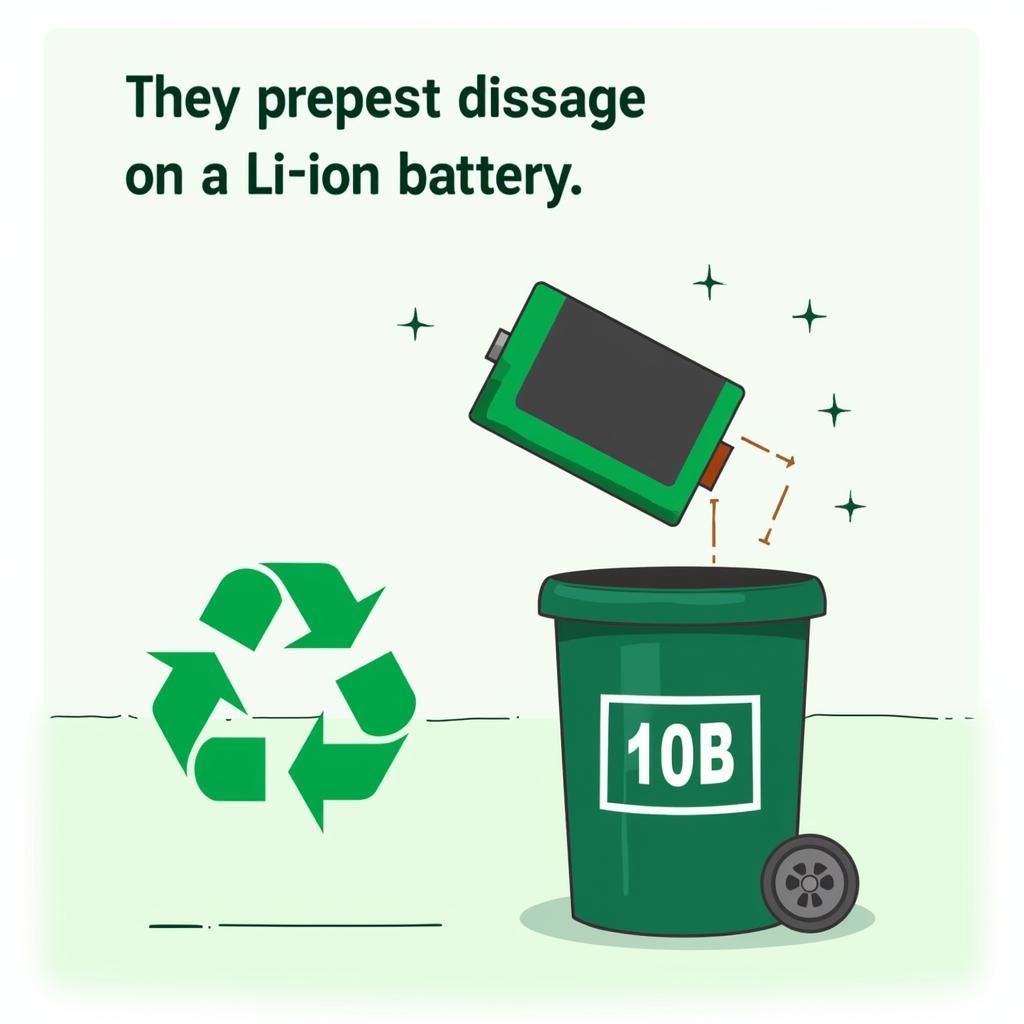Safe storage of power tools, especially those powered by Li-ion batteries, is crucial for preventing accidents and extending their lifespan. This article will provide a comprehensive guide to safely storing your Li-ion powered tools in your car, covering everything from temperature control to proper containment.
Understanding the Risks of Storing Li-ion Power Tools in a Car
Leaving power tools, particularly those with Li-ion batteries, in your car can pose several risks. Extreme temperatures can significantly impact battery performance and lifespan. Hot weather can cause Li-ion batteries to overheat, potentially leading to thermal runaway and fire. Conversely, freezing temperatures can damage the battery’s internal structure, reducing its capacity and overall lifespan. Furthermore, unsecured tools can become projectiles in the event of a sudden stop or accident.
 Damaged Li-ion Battery Due to Heat Exposure
Damaged Li-ion Battery Due to Heat Exposure
Best Practices for Safe Storage of Power Tools with Li-ion Batteries
Protecting your investment in power tools requires careful storage practices. Here are some essential tips for safe storage of Li-ion power tools in your car:
- Temperature Control: Avoid leaving your tools in a parked car for extended periods, especially during hot or cold weather. If unavoidable, park in the shade and use a sunshade to minimize heat buildup. Consider a car cooler bag for additional insulation.
- Proper Containment: Store tools in a sturdy, well-ventilated case designed for power tools. This protects them from impacts and prevents them from shifting during transit. Avoid storing loose batteries; keep them in their designated compartments within the case or in their original packaging.
- Charge Level: Ideally, store Li-ion batteries at around a 40% charge. This level minimizes stress on the battery and helps maintain its long-term health.
- Regular Inspection: Periodically inspect your batteries for any signs of damage, such as swelling, cracks, or leaks. If you notice anything unusual, discontinue use immediately and replace the battery.
- Fire Safety Precautions: Keep a small fire extinguisher suitable for lithium-ion battery fires in your vehicle. While unlikely, it’s better to be prepared.
Choosing the Right Storage Case for Your Car
Selecting the right storage case is vital for protecting your power tools and Li-ion batteries in a car environment. Opt for cases made of durable materials like heavy-duty plastic or metal. Ensure the case has ample padding and compartments to keep tools secure and prevent them from bumping into each other. A waterproof case is also recommended for added protection against moisture and spills.
 Power Tool Storage Case for Car
Power Tool Storage Case for Car
Addressing Common Concerns about Li-ion Battery Storage in Cars
Many people worry about Li-ion battery safety, especially in a car. However, by following these guidelines, you can minimize risks:
- Are Li-ion batteries more likely to explode in a hot car? While the risk is low, extreme heat can damage Li-ion batteries, increasing the possibility of thermal runaway, which could lead to fire. Proper storage and temperature management significantly reduce this risk.
- Can I store my power tools in the trunk? The trunk can experience extreme temperatures, both hot and cold. While storing tools in the trunk is acceptable for short periods, prolonged storage is not recommended.
- What should I do if I notice a damaged Li-ion battery? Discontinue use immediately and replace the damaged battery. Do not attempt to repair or charge a damaged Li-ion battery.
Expert Insights on Li-ion Battery Safety
David Miller, a certified Automotive Technician with 20 years of experience, emphasizes the importance of proper battery storage: “Li-ion batteries are powerful and efficient, but they require careful handling. Storing them correctly in your car will not only protect your investment but also ensure your safety.”
 Damaged Li-ion Battery Disposal
Damaged Li-ion Battery Disposal
Sarah Johnson, a leading Battery Technology researcher, adds, “Temperature extremes are the biggest enemy of Li-ion batteries. By controlling the temperature and using appropriate storage methods, you can drastically extend the lifespan of your power tool batteries.”
Conclusion
Safe storage of power tools and Li-ion batteries in your car is essential for both safety and performance. By following the guidelines outlined in this article – temperature control, proper containment, and regular inspection – you can minimize risks and ensure your tools are ready to use when needed. Remember to always prioritize safety and consult the manufacturer’s recommendations for specific storage instructions.
FAQ
- What is the ideal temperature range for storing Li-ion batteries? (Room temperature, ideally between 20-25°C)
- Should I disconnect the battery from my power tools when storing them? (Yes, whenever possible, disconnect the battery for long-term storage.)
- Can I store my Li-ion batteries in a plastic bag? (No, avoid storing batteries in airtight containers like plastic bags, which can trap heat and gases.)
- How often should I inspect my Li-ion batteries? (Check your batteries for signs of damage at least once a month, or more frequently if they are exposed to extreme temperatures.)
- What should I do with old or damaged Li-ion batteries? (Recycle them at a designated battery recycling center. Never dispose of them in regular trash.)
- Is it safe to leave my power tool charger plugged in my car? (No, it’s generally not recommended to leave chargers plugged in unattended in your car. This can pose a fire hazard and drain your car’s battery.)
- What type of fire extinguisher should I have for Li-ion battery fires? (A Class D fire extinguisher is recommended for lithium-ion battery fires.)
Need assistance? Contact us via WhatsApp: +1(641)206-8880, Email: [email protected] or visit us at 910 Cedar Lane, Chicago, IL 60605, USA. We have a 24/7 customer service team.

Leave a Reply